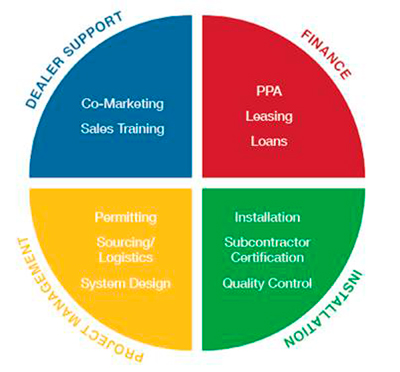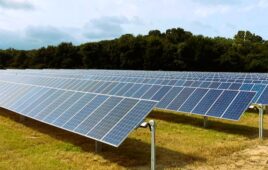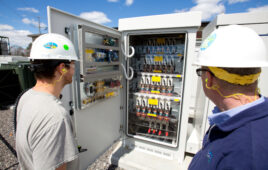How can distributors help installers improve their business practices outside of supplying components?
Demand for solar is at an all-time high. Worldwide solar demand will hit 40 to 46 GW this year and climb to 100 GW by 2018. A growing number of states in the United States want to implement renewable portfolio standards, and prices for modules have declined from $4/watt in 2008 to easily under $1/watt today.
We’re also seeing solar installers diversify into energy efficiency, roofing and other disciplines. Solar is also moving from a niche industry to a driving force in the housing and construction markets.
On the other hand, local solar dealers find themselves competing against national and global installers with greater buying power and larger marketing budgets than independent installers. Paperwork and permitting are taking up inordinate amounts of time and project financing is becoming more important adding complexity. If not managed correctly, a dealer can be mired in profitless prosperity.
Distribution is poised to reset this balance of power. Historically, distributors focused on delivery and fulfillment. Ordering through distribution simplified logistics and, in many instances, could result in better pricing. It was ultimately a product-centric business.
But the future of distribution will be increasingly focused on services. Pure-play solar distributors, for instance, will become a source for residential and commercial financing. Permitting and project design will be automated through cloud platforms created and managed by distributors.
Recruiting partners will also be managed through distribution. In the future, solar dealers will depend less on recruiting and building their own installation teams. Instead, they’ll have the option to focus on their core competency and leverage the distribution network for their other needs such as relying on contractors and teams of certified, vetted experts they will obtain through — you guessed it — distribution.
What’s driving this? Largely, it reflects of the maturity of the industry. Solar has operated like a specialty business. Installers relied on word-of-mouth to generate business and often worked on jobs in a serial fashion. As the industry advances, however, the business of solar becomes operationalized, compresses margins and turns into a price-competitive business that needs operational efficiency in many markets and also more deal flow to keep growing and profiting.
Just as important, distributors have come to realize that their most valuable asset isn’t access to products, it’s experience. You learn quite a bit being involved in thousands of installations. What are the benefits and nuances of different inverters? How long does a 5-kW installation in a particular area usually take? How do you get through a homeowners association quickly, or what can you do to get quicker permitting times for each local permitting office?
The first place where these changes are taking place is in financing. Independent dealers now have greater access to PPAs, once the province of national dealers. Mainstream banks are also entering the market. Independent solar installers aren’t going to be able to examine all of these options in time to respond to a request for proposal (RFP). Distributors will serve as their back office, comparing rates and programs so the dealer can submit a winning bid.
Likewise, most dealers are not going to be in a position to develop their own remote-modeling tool for designing systems. They also aren’t going to be in a position to test third party remote-modeling tools to determine which ones work best. Good distribution partners will bring dealers the knowledge of thousands of installs and the innovations they need to succeed.
Ultimately, if this transformation is successful, dealers will be able to get back the one commodity that is most important to growing their business: time to concentrate on what they do best.
By: Jonathan Doochin, CEO, Soligent





It seems like national distributor need to find a new way to differentiate from regional distributors. Good move!
I think provide good serve does matter for some installers. Not every solar installer has solar background. There are more and more installer step into solar electrician just few years. Good service to guide them for best practice of installation or benefit from finance policy will offer installer invaluable help on their door to door business. I know several new china distributors provide finance service or electrical drawing service for free to gain lots of customers.
There has been a significant amount of consolidation in the pure-play
solar distributors since I started in the business in the early 2000s,
with many names having completely exited the space or, ironically
enough, rolled up under Soligent. I think the remainder of the pure-play solar distributors out there need to look over their shoulder at the advancing army of nationwide electrical equipment distributors (Rexel, Gexpro, etc) that are starting to take a greater interest in the solar industry. These much larger firms have built businesses that specialize in supply chain management and account management.
Price is important to small solar installers. Unless your services offerings are really great, add value, and make sense to the customer, installers will continue to shop out equipment looking for the best price/terms/delivery options.
It’s easy to think that adding services is a panacea to the trouble of the pure-play solar distributor model. Services need to be developed in tandem with what a customer wants, otherwise no value is added. That’s not as obvious as it seems. National companies are not in better positions to advise small local installers on matters of permitting. For example, providing system design services had been a loss leader for distributors in the past. A lot of distributors offering system design or levels of engineering services never panned out to great revenue streams for the distributor. Why? Not the core focus of the business, not priced/valued correctly by customer and distribution company.
A great example of adding value both upstream and downstream is how Toyota’s consulting division spread lean manufacturing principles and business practices in their supply chains, adding value for everyone along the way (see “Lean Thinking” – Womack and Jones for some great case studies). I think the pure-play solar distributors have an opportunity just like this to make waves in the solar supply chain, promoting cost savings and best practices. Along the way, they will also learn and validate customer pain points that can result in new business and services opportunities.